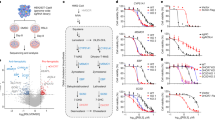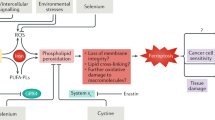Abstract
The tumor suppressor BRCA1 is mutated in a high percentage of familial breast and ovarian cancer, but our understanding of its mechanisms of action remains incomplete. We report here that glucose-regulated protein (GRP)-78, a critical regulator of the unfolded protein response (UPR), is a novel downstream target of BRCA1. We showed that overexpression of wild-type BRCA1 suppressed the expression of GRP78, whereas expression of mutant BRCA1 gene or targeted inhibition of endogenous BRCA1 using small-interfering RNA (siRNA) enhanced GRP78 expression. Knockdown of BRCA1 also led to induction of other components of UPR, such as GRP94 and CHOP. Consistent with a role of BRCA1 knockdown in mediating cell survival, forced expression of GRP78 stimulated cell proliferation and prevented apoptosis, including that induced by endoplasmic reticulum stress and chemotherapy, in ovarian OVCAR-3 and breast MCF-7 cancer cells. Overexpression of wild-type BRCA1 could increase the apoptosis of GRP78-overexpressing cells. Conversely, knockdown GRP78 by siRNA sensitized ovarian and breast cancer cells to apoptosis. This effect was reduced when the expression of BRCA1 was simultaneously knockdown by siRNA, indicating that BRCA1 also negatively regulates GRP78-mediated cell survival and resistance to apoptosis.
This is a preview of subscription content, access via your institution
Access options
Subscribe to this journal
Receive 50 print issues and online access
$259.00 per year
only $5.18 per issue
Buy this article
- Purchase on Springer Link
- Instant access to full article PDF
Prices may be subject to local taxes which are calculated during checkout





Similar content being viewed by others
References
Fernandez PM, Tabbara SO, Jacobs LK, Manning FC, Tsangaris TN, Schwartz AM et al. (2000). Overexpression of the glucose-regulated stress gene GRP78 in malignant but not benign human breast lesions. Breast Cancer Res Treat 59: 15–26.
Gowen LC, Avrutskaya AV, Latour AM, Koller BH, Leadon SA . (1998). BRCA1 required for transcription-coupled repair of oxidative DNA damage. Science 281: 1009–1012.
He QY, Zhou Y, Wong E, Ehlen TG, Auersperg N, Chiu JF et al. (2005). Proteomic analysis of a preneoplastic phenotype in ovarian surface epithelial cells derived from prophylactic oophorectomies. Gynecol Oncol 98: 68–76.
Jensen DE, Proctor M, Marquis ST, Gardner HP, Ha SI, Chodosh LA et al. (1998). BAP1: a novel ubiquitin hydrolase which binds to the BRCA1 RING finger and enhances BRCA1-mediated cell growth suppression. Oncogene 16: 1097–1112.
Lee AS . (2005). The ER chaperone and signaling regulator GRP78/BiP as a monitor of endoplasmic reticulum stress. Methods 35: 373–381.
Lee AS . (2007). GRP78 induction in cancer: therapeutic and prognostic implications. Cancer Res 67: 3496–3499.
Lee K, Neigeborn L, Kaufman RJ . (2003). The unfolded protein response is required for haploid tolerance in yeast. J Biol Chem 278: 11818–11827.
Lou Z, Minter-Dykhouse K, Chen J . (2005). BRCA1 participates in DNA decatenation. Nat Struct Mol Biol 12: 589–593.
Ma XY, Fan S, Xiong J, Yuan R, Meng Q, Gao M et al. (2003). Role of BRCA1 in heat shock response. Oncogene 22: 10–27.
Mallery DL, Vandenberg CJ, Hiom K . (2002). Activation of the E3 ligase function of the BRCA1/BARD1 complex by polyubiquitin chains. EMBO J 21: 6755–6762.
Moynahan ME, Chiu JW, Koller BH, Jasin M . (1999). Brca1 controls homology-directed DNA repair. Mol Cell 4: 511–518.
Reddy RK, Berndtsson M, Mandic A, Zhou R, Shoshan MC, Linder S . (2003). Endoplasmic reticulum chaperone protein GRP78 protects cells from apoptosis induced by topoisomerase inhibitors: role of ATP binding site in suppression of caspase-7 activation. J Biol Chem 278: 20915–20924.
Shin BK, Wang H, Yim AM, Le Naour F, Brichory F, Jang JH et al. (2003). Global profiling of the cell surface proteome of cancer cells uncovers an abundance of proteins with chaperone function. J Biol Chem 278: 7607–7616.
Thangaraju M, Kaufmann SH, Couch FJ . (2000). BRCA1 facilitates stress-induced apoptosis in breast and ovarian cancer cell lines. J Biol Chem 275: 33487–33496.
Welcsh PL, King MC . (2001). BRCA1 and BRCA2 and the genetics of breast and ovarian cancer. Hum Mol Genet 10: 705–713.
Wilson CA, Ramos L, Villasenor MR, Anders KH, Press MF, Clarke K et al. (1999). Localization of human BRCA1 and its loss in high-grade, non-inherited breast carcinomas. Nat Genet 21: 236–240.
Xu X, Qiao W, Linke SP, Cao L, Li WM, Furth PA et al. (2001). Genetic interactions between tumor suppressors Brca1 and p53 in apoptosis, cell cycle and tumorigenesis. Nat Genet 28: 266–271.
Zeng L, Lu M, Mori K, Luo S, Lee AS, Zhu Y et al. (2004). ATF6 modulates SREBP2-mediated lipogenesis. EMBO J 23: 950–958.
Zheng W, Luo F, Lu JJ, Baltayan A, Press MF, Zhang ZF et al. (2000). Reduction of BRCA1 expression in sporadic ovarian cancer. Gynecol Oncol 76: 294–300.
Zhou C, Smith JL, Liu J . (2003). Role of BRCA1 in cellular resistance to paclitaxel and ionizing radiation in an ovarian cancer cell line carrying a defective BRCA1. Oncogene 22: 2396–2404.
Acknowledgements
The present work was supported by Hong Kong Research Grants Council Grant (7484/04M) (AST Wong).
Author information
Authors and Affiliations
Corresponding author
Additional information
Supplementary Information accompanies the paper on the Oncogene website (http://www.nature.com/onc)
Supplementary information
Rights and permissions
About this article
Cite this article
Yeung, B., Kwan, B., He, Q. et al. Glucose-regulated protein 78 as a novel effector of BRCA1 for inhibiting stress-induced apoptosis. Oncogene 27, 6782–6789 (2008). https://doi.org/10.1038/onc.2008.290
Received:
Revised:
Accepted:
Published:
Issue Date:
DOI: https://doi.org/10.1038/onc.2008.290
Keywords
This article is cited by
-
Comparative proteomic and transcriptomic analysis reveals high pH–induced expression signatures of Chinese shrimp Fenneropenaeus chinensis
Functional & Integrative Genomics (2021)
-
GALNT6 promotes invasion and metastasis of human lung adenocarcinoma cells through O-glycosylating chaperone protein GRP78
Cell Death & Disease (2020)
-
Exosomes derived from siRNA against GRP78 modified bone-marrow-derived mesenchymal stem cells suppress Sorafenib resistance in hepatocellular carcinoma
Journal of Nanobiotechnology (2018)
-
Alleviation of endoplasmic reticulum stress by tauroursodeoxycholic acid delays senescence of mouse ovarian surface epithelium
Cell and Tissue Research (2018)
-
Endoplasmic reticulum stress signaling and chemotherapy resistance in solid cancers
Oncogenesis (2017)



